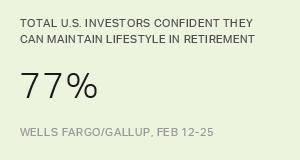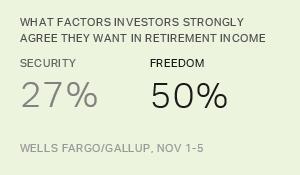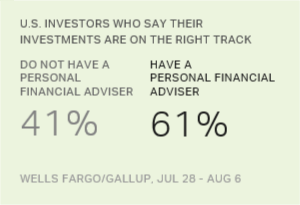Story Highlights
- Americans choose real estate as best investment for fifth straight year
- Preference for stocks remains steady near 25%
- Gold, mentioned by 17%, down by half from 2011 peak
WASHINGTON, D.C. -- More Americans name real estate over several other vehicles for growing wealth as the best long-term investment for the fifth year in a row. Just over a third cite real estate for this, while roughly a quarter name "stocks or mutual funds." Gold, mentioned by 17%, roughly ties "savings accounts or CDs" at 15%, while only a few Americans, 6%, name bonds.
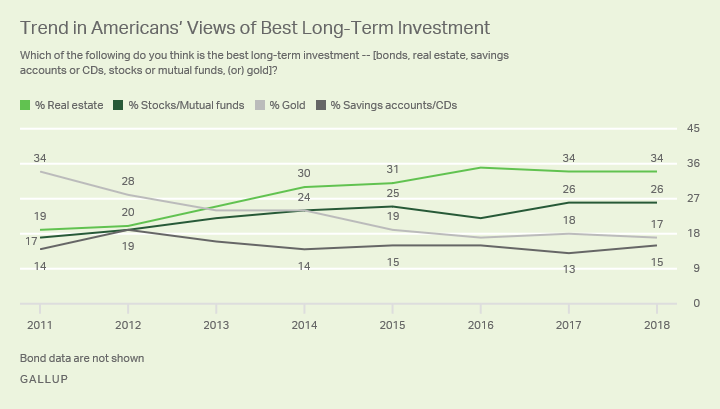
Americans' views have been fairly steady since 2015, but are a change from 2011 to 2014, when gold had greater appeal. U.S. adults' relatively high confidence in gold in 2011, when 34% considered it the best investment, was at the end of a period of double-digit growth in gold prices. At the same time, the stock market was still recovering from the 2008-2009 downturn and housing prices were still declining after the bursting of the mid-2000s housing bubble.
Gold prices have subsequently retreated as the stock and real estate markets have made strong gains, explaining the shift in Americans' views of the best place to invest.
The percentage of Americans naming traditional savings accounts and CDs or bonds has been consistently low since 2011 -- a reasonable position, given that interest rates have been at or near historical lows during this period.
Real Estate Tops Among Most Subgroups, Especially Westerners
Real estate is the top-ranking type of investment among most subgroups of Americans, including across gender, age and income categories -- with a few notable exceptions. Young adults and residents of the East and Midwest are about equally as likely to name stocks as real estate, and lower-income Americans' top choice is a tie between real estate and gold.
The selection of stocks as the best investment is fairly even by gender and age, but differs by household income. The percentage selecting stocks increases with income, from 19% among those earning less than $35,000 annually to 33% among those earning $75,000 or more.
| Real estate | Stocks | Gold | Savings accounts/CDs | Bonds | ||||||||||||||||||||||||||||||||||||||||||||||||||||||||||||||||||||||||||||||||||||||||||||||||
|---|---|---|---|---|---|---|---|---|---|---|---|---|---|---|---|---|---|---|---|---|---|---|---|---|---|---|---|---|---|---|---|---|---|---|---|---|---|---|---|---|---|---|---|---|---|---|---|---|---|---|---|---|---|---|---|---|---|---|---|---|---|---|---|---|---|---|---|---|---|---|---|---|---|---|---|---|---|---|---|---|---|---|---|---|---|---|---|---|---|---|---|---|---|---|---|---|---|---|---|---|
| % | % | % | % | % | ||||||||||||||||||||||||||||||||||||||||||||||||||||||||||||||||||||||||||||||||||||||||||||||||
| Gender | ||||||||||||||||||||||||||||||||||||||||||||||||||||||||||||||||||||||||||||||||||||||||||||||||||||
| Men | 35 | 27 | 18 | 10 | 7 | |||||||||||||||||||||||||||||||||||||||||||||||||||||||||||||||||||||||||||||||||||||||||||||||
| Women | 33 | 25 | 15 | 19 | 6 | |||||||||||||||||||||||||||||||||||||||||||||||||||||||||||||||||||||||||||||||||||||||||||||||
| Age | ||||||||||||||||||||||||||||||||||||||||||||||||||||||||||||||||||||||||||||||||||||||||||||||||||||
| 18 to 34 | 29 | 28 | 11 | 21 | 9 | |||||||||||||||||||||||||||||||||||||||||||||||||||||||||||||||||||||||||||||||||||||||||||||||
| 35 to 54 | 37 | 25 | 18 | 15 | 4 | |||||||||||||||||||||||||||||||||||||||||||||||||||||||||||||||||||||||||||||||||||||||||||||||
| 55 and older | 34 | 26 | 21 | 10 | 7 | |||||||||||||||||||||||||||||||||||||||||||||||||||||||||||||||||||||||||||||||||||||||||||||||
| Income | ||||||||||||||||||||||||||||||||||||||||||||||||||||||||||||||||||||||||||||||||||||||||||||||||||||
| $75,000 and over | 43 | 33 | 12 | 5 | 6 | |||||||||||||||||||||||||||||||||||||||||||||||||||||||||||||||||||||||||||||||||||||||||||||||
| $35,000 to $74,999 | 33 | 23 | 17 | 18 | 6 | |||||||||||||||||||||||||||||||||||||||||||||||||||||||||||||||||||||||||||||||||||||||||||||||
| Less than $35,000 | 25 | 19 | 24 | 20 | 8 | |||||||||||||||||||||||||||||||||||||||||||||||||||||||||||||||||||||||||||||||||||||||||||||||
| Region | ||||||||||||||||||||||||||||||||||||||||||||||||||||||||||||||||||||||||||||||||||||||||||||||||||||
| East | 36 | 34 | 11 | 14 | 4 | |||||||||||||||||||||||||||||||||||||||||||||||||||||||||||||||||||||||||||||||||||||||||||||||
| Midwest | 27 | 28 | 19 | 19 | 6 | |||||||||||||||||||||||||||||||||||||||||||||||||||||||||||||||||||||||||||||||||||||||||||||||
| South | 29 | 24 | 20 | 15 | 7 | |||||||||||||||||||||||||||||||||||||||||||||||||||||||||||||||||||||||||||||||||||||||||||||||
| West | 45 | 21 | 14 | 10 | 8 | |||||||||||||||||||||||||||||||||||||||||||||||||||||||||||||||||||||||||||||||||||||||||||||||
| Gallup, April 2-11, 2018 | ||||||||||||||||||||||||||||||||||||||||||||||||||||||||||||||||||||||||||||||||||||||||||||||||||||
Beyond the rank-order differences in perceptions of the best investment, residents of the West and upper-income Americans are more likely than their counterparts to identify real estate as the best choice.
The gap between the West and other regions in naming real estate has been particularly large in each of the past two years, but before that, the West was still among the most positive of all regions about real estate. By contrast, the Midwest has consistently lagged behind the other regions in valuing real estate. However, confidence in real estate has increased in all four regions since 2011.
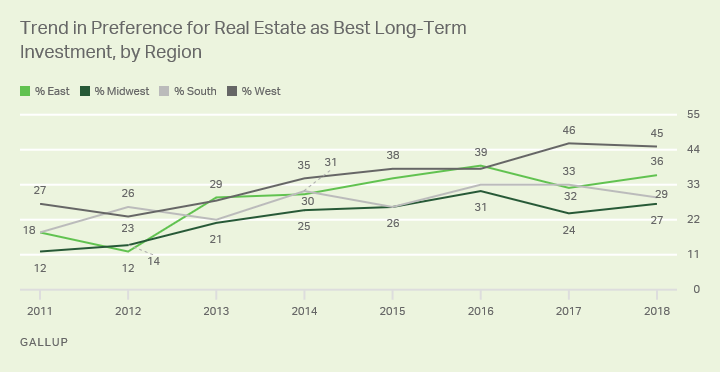
Bottom Line
Americans' perceptions about the best vehicle for investing remain in a holding pattern, with real estate continuing as the top choice and stocks/mutual funds running a strong second. While the stock market has enjoyed an impressive nine-year bull market, including a better-than 20% average rate of return in 2017, the re-emergence of volatility earlier this year may be keeping a lid on any expansion of Americans' preference for stocks as the best investment.
One reason real estate may rank first is that more Americans own their own home than own stocks -- 63% and 54%, respectively. Regardless, given the importance of 401(k) accounts to Americans' retirement security, the reality is the stock market serves as an important investment vehicle for most Americans, making it critical that they have confidence in stocks as a way to grow wealth. In 2017, Gallup found 50% of nonretirees saying a 401(k) would be a major source of income for them in retirement, compared with only 9% counting this much on rent or royalties.
Whatever they believe to be the best investment, Americans need to save more. According to the latest Wells Fargo/Gallup Investor and Retirement Optimism Index survey, just one-third of U.S. investors -- those with at least $10,000 in investments -- are highly confident that they will have enough money saved to maintain their preferred lifestyle in retirement.
Survey Methods
Results for this Gallup poll are based on telephone interviews conducted April 2-11, 2018, with a random sample of 1,015 adults, aged 18 and older, living in all 50 U.S. states and the District of Columbia. For results based on the total sample of national adults, the margin of sampling error is ±4 percentage points at the 95% confidence level. All reported margins of sampling error include computed design effects for weighting.
Each sample of national adults includes a minimum quota of 70% cellphone respondents and 30% landline respondents, with additional minimum quotas by time zone within region. Landline and cellular telephone numbers are selected using random-digit-dial methods.
View survey methodology, complete question responses and trends.
Learn more about how the Gallup Poll Social Series works.


